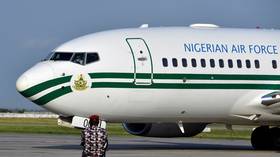Debt-distressed Nigeria sets ‘ambitious’ revenue target
The African nation plans to increase oil production to at least 2 million barrels per day, its finance minister has said
Nigeria is aiming to increase revenues by 60% this year to help keep debt at sustainable levels and alleviate economic hardship, Finance Minister Wale Edun said on Wednesday, according to the Semafor Africa news outlet.
While the target is ambitious, it is necessary for the West African country to reduce its fiscal deficit from 6.1% of GDP to 3.8%, Edun said in a speech at Semafor’s World Economy Summit in Washington.
According to the Nigerian Debt Management Office, Abuja’s public debt reached $108.2 billion at the end of 2023, representing an increase of 123% since 2012, roughly six times the country’s GDP growth rate. Last year, debt financing took up more than 90% of the government’s budget.
Finance Minister Edun has said debt will remain a source of development financing for the Nigerian government, but it can be addressed through revenue.
“Look at the US’s debt figures but the difference is that they have the revenue – taxes and other government income – to service it,” he said, adding that “that’s what lenders want.”
The official stated that as part of revenue-generating measures, Abuja is working to increase oil production to at least 2 million barrels per day (bpd).
Last year, Africa’s top oil producer failed to meet its 2023 target of 1.69 million bpd, producing only 1.47 million, according to the Nigerian Upstream Petroleum Regulatory Commission.
Edun said the government has made some progress in addressing the long-standing issues of theft and pipeline sabotage, which have hindered the country’s efforts to generate foreign exchange from recent increases in oil prices.
Additionally, he stated that Africa’s most populous country plans to shore up earnings through “greater efficiency in collecting taxes and other fees and charges that the government has a right to impose” using digital technology.
Protests have erupted in Nigeria in recent months over the country’s escalating economic crisis. Labor unions have demanded that authorities stop borrowing from the International Monetary Fund and the World Bank, claiming that such loans are exacerbating the situation.
The country has been grappling with an economic downturn since President Bola Tinubu, who took office on May 29, ended a fuel subsidy as part of a budget deficit-cutting reform package. The depreciation of the local currency, the naira, has raised the price of goods.
Tinubu has recently implemented a number of cost-cutting reforms, including a temporary ban on publicly funded international travel for government officials. Local media reported earlier this month that Abuja intends to sell three jets from its Presidential Air Fleet (PAF) due to budget concerns.



